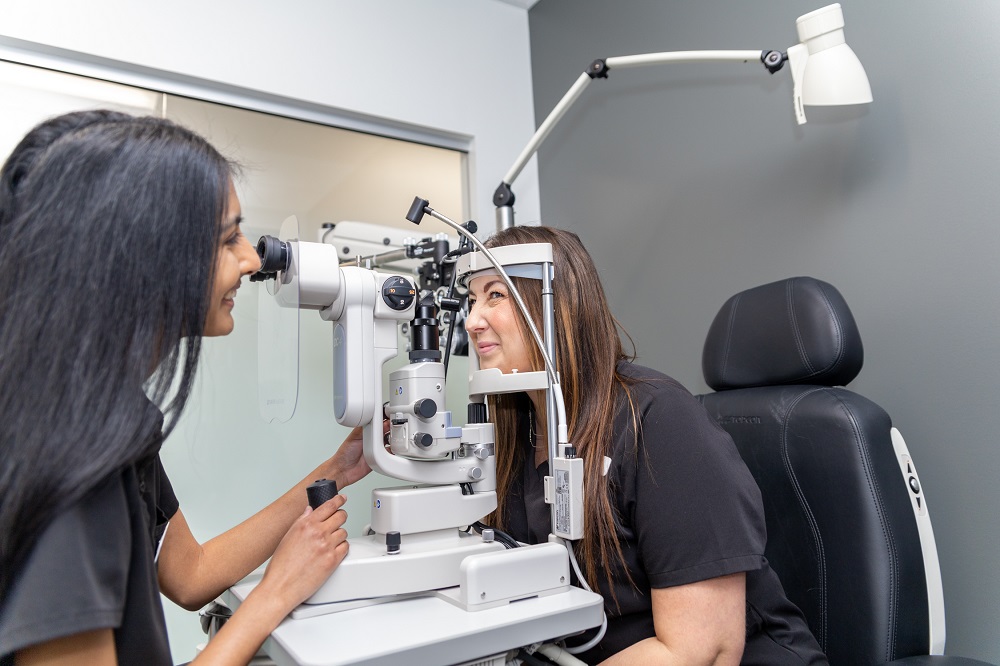Your eyes are your windows to the world, and protecting them requires more than just routine vision checks. At Rim Optical, Dr. Paul Nguyen combines advanced diagnostic technology with personalized care to detect and manage eye diseases before they threaten your vision. Through comprehensive screenings and proven treatment protocols, we help preserve your sight and maintain optimal eye health throughout every stage of life.
Ocular Disease Management

Understanding Ocular Disease Management
Ocular disease management encompasses the detection, treatment, and ongoing monitoring of conditions that can damage your eyes and vision. Unlike basic vision exams that primarily check for refractive errors, comprehensive disease management examines the complete health of your eye structures. This includes evaluating your retina, optic nerve, blood vessels, and other critical components that work together to create clear vision.
Many eye diseases develop silently without obvious symptoms until significant damage occurs. Conditions like glaucoma, diabetic retinopathy, and macular degeneration can steal your vision gradually, making early detection crucial for preserving sight. Through regular screenings and advanced imaging technology, eye care professionals can identify these conditions in their earliest stages when treatment options are most effective.

Benefits of Ocular Disease Management
Prevents Irreversible Damage
Diseases like glaucoma silently destroy optic nerve fibers that cannot regenerate once lost, while diabetic retinopathy damages delicate blood vessels in ways that become irreversible without timely intervention. Through consistent monitoring and treatment adjustments, disease management maintains stable eye health and prevents the structural damage that leads to permanent vision impairment.
Reduces Emergency Eye Situations
Conditions like acute angle-closure glaucoma, severe eye infections, or retinal detachments often develop from underlying diseases that proper management would have identified and treated. By maintaining consistent care and following prescribed treatments, you avoid the trauma, expense, and potential vision loss associated with eye emergencies.
Maintains Treatment Effectiveness
Eye diseases often change over time, requiring modifications to medication types, dosages, or treatment approaches to maintain effectiveness. Your eye care team tracks how well current therapies control your condition, identifying when changes are needed before treatment failure occurs. This adaptive management approach prevents the frustration of ineffective treatments and maintains consistent disease control throughout the progression of your condition.
Minimizes Disease Complications
Comprehensive ocular disease management prevents secondary problems that often develop when primary eye conditions go untreated or poorly controlled. For instance, chronic dry eye can lead to corneal damage and infection, while uncontrolled eye pressure in glaucoma may cause painful headaches and nausea. Through proper disease management, you avoid these cascading complications that compound your original condition.
Enables Lifestyle Adaptations
Effective ocular disease management provides you with specific strategies to modify daily activities in ways that protect your vision while maintaining your quality of life. Whether it’s computer screen adjustments, lighting recommendations, or dietary changes to support eye health, disease management empowers you with actionable steps.
Our Ocular Disease Management Process
Establishing Your Eye Health Baseline
We begin with advanced Optomap retinal imaging that captures detailed pictures of your eye structures without dilation discomfort. This comprehensive screening examines your retina, optic nerve, and blood vessels while documenting your medical history and current symptoms. The high-resolution images establish a baseline for tracking future changes, ensuring nothing goes unnoticed during your ocular disease management.
Determining Your Diagnostic Approach
Your specific symptoms and risk factors determine which specialized tests we perform next. Visual field testing detects glaucoma, OCT scans reveal macular changes, and tear film analysis identifies dry eye disease. Our in-house technology delivers immediate results, eliminating wait times and enabling same-day treatment decisions when necessary.
Tailoring Your Targeted Treatment Solution
Dr. Paul Nguyen develops your personalized management plan based on test results and your unique health profile. Treatment options range from prescription eye drops and oral medications to in-office procedures and nutritional supplements. We coordinate with your other physicians when systemic conditions affect your eyes, ensuring integrated care that addresses all aspects of your health.
Observing Your Optical Performance
Regular monitoring appointments use comparative imaging to measure treatment effectiveness and disease progression. Visit frequency depends on your condition’s stability; monthly for active disease management or annually for preventive screening. We adjust medications, modify treatment approaches, and incorporate new therapies based on how your eyes respond to current interventions.
Continuing Your Care at Home
Success in ocular disease management extends beyond office visits to daily eye care habits. We teach proper medication techniques, provide lifestyle recommendations, and explain warning signs that require immediate attention. Our team remains available for questions between appointments, ensuring continuous support as you maintain your eye health at home.
Why Choose Us
When eye disease threatens your vision, you need more than basic care. You need a practice that catches problems others miss. Rim Optical transforms complex ocular disease management into clear, actionable solutions through our unique combination of hospital-level technology and small-practice attention. Dr. Paul Nguyen applies expertise gained from treating veterans with complex eye conditions to every patient who walks through our doors, while our Optomap imaging reveals disease markers that standard equipment cannot detect. Unlike practices that send you elsewhere for specialized testing or make you wait weeks for results, our in-house capabilities deliver answers immediately, allowing treatment to begin the same day when time matters.

Protect Your Vision with Ocular Disease Management Today!
Don’t let another day pass wondering about the health of your eyes. Comprehensive ocular disease management at Rim Optical puts you in control of your vision future. Dr. Paul Nguyen and our experienced team are ready to provide the advanced screening and personalized care your eyes deserve, using technology that reveals what standard exams miss. Stay connected with eye health tips and updates on our Facebook page, and when you’re ready to schedule your comprehensive evaluation, call or text us at (512) 764-6850, because protecting your vision shouldn’t wait.
FAQs
How to cure dry eyes permanently?
While there’s no universal permanent cure for dry eyes, effective long-term management can eliminate symptoms for many patients. Treatment options range from prescription drops and in-office procedures to lifestyle modifications and nutritional supplements. With proper diagnosis and consistent treatment, most people achieve significant relief and can maintain comfortable, healthy eyes indefinitely.
What is macular degeneration?
Macular degeneration is a progressive eye disease that damages the macula, the central part of your retina responsible for sharp, detailed vision. This condition primarily affects people over 50 and comes in two forms: dry (more common) and wet (more severe). Early stages may cause no symptoms, but as it progresses, you might notice blurred central vision, dark spots, or distorted images. Regular eye exams with retinal imaging can detect macular degeneration early, when treatment options like nutritional supplements or injections can slow its progression.
What is thyroid eye disease?
Thyroid eye disease is an autoimmune condition where your immune system mistakenly attacks the tissues around your eyes, causing inflammation and swelling. Common symptoms include bulging eyes, double vision, eye pressure, and difficulty closing your eyelids completely. Treatment may involve medications to reduce inflammation, artificial tears for comfort, or surgery in severe cases, with management tailored to your specific symptoms and disease severity.
How do I know if I have dry eyes?
Dry eye symptoms can be surprisingly varied, including burning, stinging, excessive tearing, blurred vision, and feeling like something is in your eye. You might notice increased discomfort in windy or dry environments, difficulty wearing contact lenses, or eye fatigue after reading or computer use. A comprehensive eye examination with specialized tests can measure your tear production and quality to confirm the diagnosis.
Why can't I keep my eyes open?
Difficulty keeping your eyes open can stem from several causes, including severe dry eye, light sensitivity, blepharospasm (involuntary eyelid spasms), or eye strain. Sometimes it indicates underlying conditions like migraines, neurological issues, or medication side effects. Persistent problems with keeping your eyes open warrant professional evaluation to identify the cause and develop appropriate treatment.

